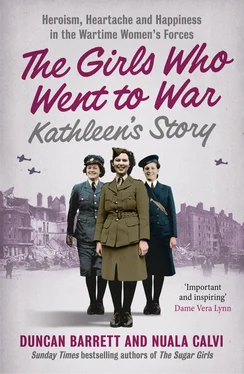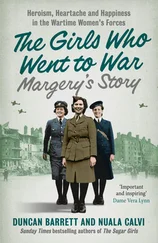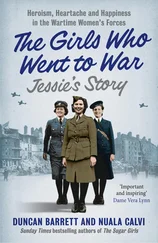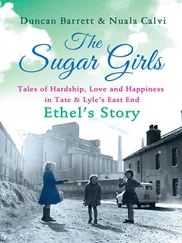Kathleen hoped it wouldn’t be long before the two of them could be married, but to her surprise Arnold told her that he wanted to wait until the war was over. ‘I’ll never forget the woman who used to wash our steps and windows,’ he told her. ‘She had been wealthy once, but when her husband was killed in the last war she was left with two young children to support by herself. I wouldn’t want that to happen to you, my dear.’
‘Yes, of course, you’re right,’ Kathleen replied, trying to hide her disappointment. If it was up to her, she would have married Arnold then and there, but she was willing to abide by his decision.
After Arnold had left, Kathleen showed her mother the ring. ‘I knew it!’ Mrs Skin declared, ecstatically. ‘I just knew that you’d be married before the year was out! Oh isn’t he wonderful, Kath. What a lovely man you’ve found yourself! I’d better start seeing about your trousseau.’
‘We’re not getting married until after the war, Mum,’ Kathleen protested weakly. But it was no use reasoning with her mother. Mrs Skin was already off to tell all her friends, and gather material for her daughter’s bottom drawer.
After many months in the Land Army, Kathleen’s body had gradually grown stronger and more resilient as she adapted to the rigours of 12-hour days working the land. Now she was determined to try again with the Navy, so she said her goodbyes to Minnie and the rest of the staff in the strange old house at Bury St Edmunds, and took a train down to London. There she made her way to the national headquarters of the WRNS, which was housed above Drummond’s Bank in Trafalgar Square.
But despite her best efforts to convince the women there that she was just what the service needed, they insisted that there still wasn’t a place for her. ‘I’m sorry,’ one of them told her, ‘but we’ve just got too many people volunteering at the moment. Maybe you could try again in another six months.’
Kathleen was disappointed at being turned down by the WRNS for a second time, and it was especially galling to think that while she had been waiting to reapply, other girls had taken the available places. But she couldn’t bear the thought of heading back to the house in Bury with her tail between her legs, so instead she began looking for war work in London.
Before long, Kathleen had swapped the jumper and breeches of a land girl for the blue overalls of an ambulance auxiliary. It was far from the high couture of the tailored Wren uniform that she had long coveted, but at least, she reasoned, the new job would bring with it different challenges – and, hopefully, less back-breaking work.
Since she didn’t drive, Kathleen was paired up with a girl who did – a young woman called Hilde with whom she was soon sharing a small flat in Chiswick. The two girls hit it off instantly, and when Kathleen learned Hilde’s sad story it only cemented the bond. ‘My husband walked out as soon as he found out I was pregnant,’ Hilde confided one evening, explaining that her daughter Joy was now living with a family in the countryside while she worked on the ambulances to support her.
Hilde and Kathleen’s ambulance – in reality a converted van – was based at the offices of United Dairies in Chiswick, a location they came to know extremely well as they spent night after night there sitting around waiting for the phone to ring. The other volunteers included several members of the same family, who had all volunteered together and were all actors. Kathleen and Hilde soon grew used to being hugged and kissed effusively whenever they came into the office, and to being addressed exclusively as ‘darling’. More of a trial were the histrionic rows between the father and his eldest daughter, which seemed to erupt on a daily basis and frequently descended into furious swearing matches.
On the whole, though, it was a quiet time for the men and women working on the ambulances. Since the London Blitz had come to an end in May 1941, German attacks on the capital had grown increasingly infrequent, limited to the occasional ‘nuisance raids’ on targets of no military significance. But while they might be little more than a nuisance as far as winning the war was concerned, these small, sporadic attacks could be deadly for the poor souls caught up in them.
The first time Hilde and Kathleen were called out, it was to a pub in Hammersmith which had suffered a direct hit. They hopped in their little van and sped over as quickly as possible, reaching the bombsite within ten minutes.
By the time the girls arrived, there were plenty of other people already on the scene. ‘No point going in there,’ a Special Constable told Kathleen, as she gazed in horror at the pile of rubble where only minutes before the pub had stood. ‘There were a load of troops in the cellar when it hit. The pipes down there burst and the lot of them drowned before we could get them out.’
As the policeman turned and walked off into the darkness, Kathleen became aware of a dog barking somewhere nearby. She followed the sound to a house adjacent to the pub, which had also been badly damaged. Most of the front wall had come down, and Kathleen walked through a space where the door had once stood into what was left of the living room.
Inside she found a black-and-white sheepdog, which by now was howling plaintively, a few feet away from the body of an old man who was evidently its master. ‘It’s all right,’ she told the distraught animal, in as calm a voice as she could manage. She didn’t dare reach out a hand to stroke it, in case it lashed out and bit her in fear.
Kathleen continued to make cooing noises at the dog while she knelt down to examine the old man. He was alive, but only just. A large part of his face had been blown off by the explosion, and his breathing was shallow. She could tell at once that he had no chance of surviving his injuries.
Kathleen took a towel and wrapped it around the man’s head. Then she sat on the floor, gently cradling him, all the while whispering to the frantic dog, ‘It’s all right, don’t worry, it’s all right.’
Within a couple of minutes the last spark of life had departed and Kathleen set the man’s lifeless body down on the floor. Then she went to summon Hilde, and between them they heaved him onto a stretcher and carried him out to their ambulance.
As they drove away, she could still hear the poor dog howling, rooted to the spot in the room where its master had died.
The bomb had left no survivors for the girls to transport to the local hospital, so instead they drove straight to Hammersmith Cemetery, where a man on the gate directed them towards the mortuary. There were so many bodies coming in that night that the building was already full, and as the corpses arrived they were being laid out on the pavement outside. Kathleen tried not to look at the faces, but she couldn’t help noticing that many of them had been terribly disfigured and some bodies were missing arms or legs.
By the time Kathleen and Hilde had got the old man out of the ambulance and laid him out alongside the other victims of the night’s raid, their shift was coming to an end. They returned the ambulance to the United Dairies offices, and trudged back to their little flat. It was only once they were on their way home that the horror of the evening overcame them, and they both had to stop and vomit by the side of the road.
As the weeks and months went on, Kathleen and Hilde grew accustomed to the horrors of the air raids. Collecting severed arms and legs in an old tarpaulin and matching them up with dead bodies they had found became routine, as did braking suddenly when huge craters appeared in the middle of the road in front of them. They got used to sleepless nights and uneaten meals, and to frequent stops to throw up in the gutter.
Читать дальше












